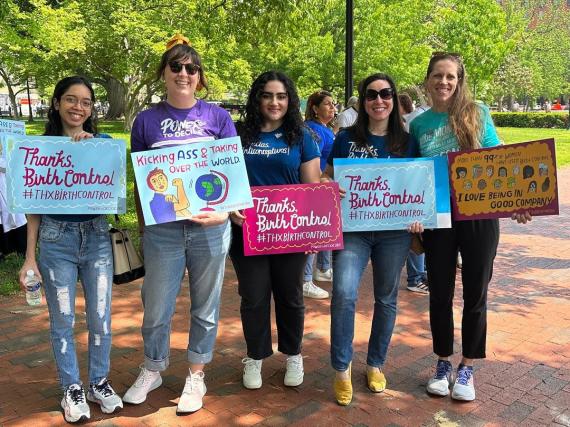Supporting Young People's Mental Health
Through the last few years, young folks have faced a tough landscape when it comes to their mental health. In addition to the usual stresses of being teens, they have also had to grapple with the pandemic, quarantine, and a tumultuous political landscape. And while we usually encourage you to be that trusted adult for conversations about sex and relationships, we want to use this opportunity to give you the tools to bring mental health into those discussions.
Model Self-Care
Just like reproductive well-being, mental health is a lifelong project if you’re doing it right, but that doesn’t mean you can’t do small things to work on it every day. One of the best ways to encourage young folks in your life to practice self-care is to implement it into your own life. Taking time to reflect, journaling, practicing breathing exercises, doing yoga, or starting a regular practice of going to therapy are all ways you can model commitment to your mental health. Be open with your young person about why you’re taking the time to focus on yourself and inspire them to find their own practices.
Establish a Safe Space
Mental health can carry a lot of stigma–especially in marginalized communities. These conversations can be difficult but it’s important to make sure that the young people in your life know that you’re there for them unconditionally. Even if your teen wants to, it may be difficult for them to express their feelings and trust that you will take them seriously. What’s most important is your willingness to listen without passing judgment. Keep the lines of communication open and check in often.
Acknowledging Their Losses
Grief can be a response to losing a person–but it can also come from drastic changes to daily routines and ways of life. Research shows that because of the pandemic, young folks have “experienced substantial loss, especially losses related to their education and social life/events.” Recognize and honor that missing out on landmark events like proms and graduations, along with generally being separated from their peers throughout quarantine, is something to grieve. Even if you can’t relate to what they’re going through, make sure to take their struggles seriously. Young people are more likely to open up to adults who make them feel heard and validated!
Recognize the Warning Signs
It's completely normal for anyone to feel moody or sad at times. With depression, it’s a more serious state of mind can last for weeks, months, or even longer. And with teenagers, it can be difficult to determine what’s going on. That’s why familiarizing yourself with the warning signs of depression and constantly being on the lookout is the best way to support your young people. Behaviors like sudden problems at school, changes in sleep/diet, loss of interest in hobbies/friends, neglecting personal hygiene, and more can all be signals that your young person is going through something that might require intervention.
Help Them Access Support
Giving your love, attention, and support to a young person can be extremely impactful, but it’s not always enough. Don’t be afraid to seek professional treatment when it comes to their mental health. These folks have advanced training, and many even specialize in working with teens. Check out Psychology Today’s database of therapists, where you can search by specialization, type of therapy, therapist’s gender, if they offer a sliding scale for payment, and more. But make sure to get your teen’s input on their treatment plan and keep the door open for adjustments. Acknowledge their preferences and involve them in decision-making. Ultimately, you want to give your young person the tools they need to succeed on their own.
October is Let’s Talk Month, AKA the perfect chance to run with these tips and establish yourself as a trusted adult with the young people in your life. You never know the power your voice could have.



